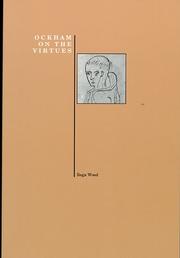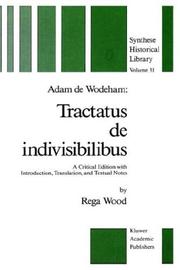| Listing 1 - 8 of 8 |
Sort by
|

ISBN: 1557530971 9781557530974 Year: 1997 Publisher: West Lafayette Purdue university press
Abstract | Keywords | Export | Availability | Bookmark
 Loading...
Loading...Choose an application
- Reference Manager
- EndNote
- RefWorks (Direct export to RefWorks)
Virtues --- History of doctrines --- Early works to 1800. --- 1 GUILELMUS DE OCCAM --- Filosofie. Psychologie--GUILELMUS DE OCCAM --- 1 GUILELMUS DE OCCAM Filosofie. Psychologie--GUILELMUS DE OCCAM --- Virtue --- Early works to 1800 --- William, --- Virtues - History of doctrines - Middle Ages, 600-1500. --- Virtues - Early works to 1800.

ISBN: 9027724245 9401071381 9400914253 9789027724243 Year: 1988 Volume: 31 Publisher: Dordrecht Kluwer
Abstract | Keywords | Export | Availability | Bookmark
 Loading...
Loading...Choose an application
- Reference Manager
- EndNote
- RefWorks (Direct export to RefWorks)
Indivisibles (Philosophy) --- Early works to 1800. --- -Philosophy --- Continuity --- Early works to 1800 --- -Early works to 1800 --- Philosophy --- Indivisibles (Philosophy) - Early works to 1800.
Book
ISBN: 9781576591048 1576591042 Year: 1990 Publisher: St. Bonaventure (N.Y.): St. Bonaventure University,
Abstract | Keywords | Export | Availability | Bookmark
 Loading...
Loading...Choose an application
- Reference Manager
- EndNote
- RefWorks (Direct export to RefWorks)
Book
ISBN: 9780197264997 0197264999 Year: 2011 Publisher: Oxford Oxford university press
Abstract | Keywords | Export | Availability | Bookmark
 Loading...
Loading...Choose an application
- Reference Manager
- EndNote
- RefWorks (Direct export to RefWorks)
Richard Rufus of Cornwall was an early Scholastic philosopher-theologian who taught at the Universities of Paris and Oxford between 1231 and 1255. In those years he played a vital part in the transformation of philosophy and theology in early thirteenth-century Western Europe. He pioneered the teaching of metaphysics, physics, chemistry, psychology, and ethics. At Paris Rufus gave the earliest lectures on Aristotelian physics and metaphysics of which a record survives. Although acknowledged as a great scholar in his lifetime, his devotion to the Franciscan ideal of humility led him deliberately to seek obscurity and for 500 years his work was lost or misattributed. This is the second volume of Richard Rufus's writings in the Auctores Britannici Medii Aevi series, a companion to In Physicam Aristotelis also edited by Professor Rega Wood. De Generatione et corruptione is particularly notable for its accounts of divisibility, growth and Aristotelian mixture. This transforms our understanding of the introduction of Aristotelian natural philosophy to the West and provides insight into the early history and prehistory of chemistry.
Causation. --- Four elements (Philosophy) --- Aristotle. --- Four elements (Philosophy). --- Causation - Early works to 1800 --- Four elements (Philosophy) - Early works to 1800 --- Science, Ancient - Early works to 1800 --- Reproduction - Early works to 1800 --- Putrefaction - Early works to 1800 --- Aristotle. - De generatione et corruptione
Book
ISBN: 9780197266908 0197266908 Year: 2022 Publisher: Oxford Oxford university press
Abstract | Keywords | Export | Availability | Bookmark
 Loading...
Loading...Choose an application
- Reference Manager
- EndNote
- RefWorks (Direct export to RefWorks)
This is the first great commentary in the Western European tradition of expounding Aristotle's Metaphysics. Dated about 1238, this work by Richard Rufus of Cornwall is a major contribution to the history of Western philosophy and the study of Aristotle. Indeed, no future account of thirteenth century philosophical psychology will be able to ignore the contribution of Richard Rufus. Following Aristotle, Rufus addresses questions as diverse as `what is truth?' `what is matter?', what are numbers?', `how do corruptible and incorruptible substances differ?', and `how do sensible objects act on the soul?'. Its exposition of Aristotle and its exciting questions date from about 35 years before Thomas Aquinas wrote his commentary on the Metaphysics. Its publication will prompt a re-evaluation of the origins of Western metaphysics generally and the subsequent work of Thomas Aquinas. As the copious notes to this edition indicate, it was a very influential work that exercised great influence on the two most popular early Aristotle commentators, Adam Buckfield and Albert the Great.
Book
Year: 1981 Publisher: St. Bonaventure (N.Y.): St. Bonaventure University. Franciscan institute,
Abstract | Keywords | Export | Availability | Bookmark
 Loading...
Loading...Choose an application
- Reference Manager
- EndNote
- RefWorks (Direct export to RefWorks)
Book
Year: 1984 Publisher: St. Bonaventure (N.Y.): St. Bonaventure University. Franciscan institute,
Abstract | Keywords | Export | Availability | Bookmark
 Loading...
Loading...Choose an application
- Reference Manager
- EndNote
- RefWorks (Direct export to RefWorks)
Book
ISBN: 9780197266489 0197266487 Year: 2018 Publisher: Oxford Oxford university press
Abstract | Keywords | Export | Availability | Bookmark
 Loading...
Loading...Choose an application
- Reference Manager
- EndNote
- RefWorks (Direct export to RefWorks)
This work by Richard Rufus of Cornwall is a major contribution to the history of Western philosophy and the study of Aristotle. Indeed, no future account of thirteenth century philosophical psychology will be able to ignore the contribution of Richard Rufus. Following Aristotle, Rufus addresses questions as diverse as 'how do we reproduce and grow', 'how do we see and hear', 'how do we understand ourselves', and 'how is our immortal soul united with our body?' Its exposition and its questions date from about 35 years before Thomas Aquinas wrote his commentary on On the Soul, so its publication will prompt a re-evaluation of Aquinas's theory of the soul. As the copious notes to this edition indicate, not only is this the earliest surviving commentary on Aristotle's On the Soul taught at a Western University, but it was read by most of Rufus's early successors.
Scholasticism. --- Aristotle. --- De anima (Aristotle). --- Scholasticism --- Aristotle - De anima
| Listing 1 - 8 of 8 |
Sort by
|

 Search
Search Feedback
Feedback About UniCat
About UniCat  Help
Help News
News